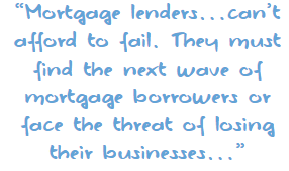Keeping up with the dynamic mortgage and servicing industry, MReport has released their 2019 list of the Top 25 Companies in Mortgage and Servicing that were nominated by team members who work within these organizations. Nominations were divided into five categories, including Legal, Lender/Servicer, Service Provider, Tech Provider, and Women- or Minority-Owned/Operated.

Know an Incredible Woman Preserving the
Quality of Life During COVID-19?
Submit your story today!
Read More

Consulting & Branding Opportunities
Grant your business access to insider,
proven knowledge to improve the quality of your procured
services and maximize business performance.

If you need D&I
Contact Us!
A Team Focused on Bring Diversity and Inclusion to Every Level
Learn More

#1 Top Real Estate Influencer
Desiree Patno
Diversity & Inclusion, Quality of Life, Know the Rules of the Game ®
Your Next Event
Grow Your Business
NAWRB: An SBA Resource
NAWRB is listed as a women-owned business resource for the SBA.
Check It Out
NAWRB Aging Population
Help Protect Elders
from Financial Abuse
Over $36.5 billion a year is lost annually in the U.S.
Prevent Financial Abuse

Women's Homeownership:
Dream. Stability. Sanctuary.
Life often presents us
with unplanned disruptions.

AI Technology
with
a Human Touch
Is
The Perfect Balance


NAWRB Women's Global Resource Center
A women’s depository for vendors & clients to grow their diverse spend & increase women’s employment at all levels within the housing ecosystem.

Tag Archives: mortgage
Housing Costs Ease for Homeowners But Not Renters Since 2008
A decade after the housing crisis, a U.S. Census Bureau report shows that housing cost burden has eased for homeowners but has remained stagnant for renters since the peak of the recession. Recent data from the American Community Survey (ACS) estimates the percentage of “burdened” households that spend at least 35 percent of their monthly income on housing costs.
Who is Freddie Mac Today?
Often in the industry, when we think of the forty-eight-year-old Government Sponsored Entity The Federal Home Loan Mortgage Corporation, otherwise known as Freddie Mac, we think: “I’d love to be an REO broker with them” or “I’d love to be in a vendor relationship with them.” However, as we discovered in our “Who is Freddie Mac Today?” presentation, the GSE is way more than meets the eye, staying on the young side of forty-eight with an eye toward innovation and staying current. Continue reading →
SHETalk: Rebecca Steele on Becoming a Disruptor
“My Story Is Different Than Most”
“It’s just been an incredible conference. The women who have been here and all of you who I’ve met with have been the highlight of my year so far, really,” said Rebecca Steele taking over the stage for her SHETalk on day two of our conference.
Her story, she revealed, is different than most. “I have been through crisis,” she said, “But I will tell you that I’ve been very, very fortunate to have some of the opportunities that I’ve had.”
Stories of Character and Courage-NDILC Luncheon Panel
After a jam-packed morning of information and new industry developments, our conference attendees were treated to an informal panel session led by NDILC (NAWRB Diversity and Inclusion Leadership Council) Chairwoman, President & CEO of NAWRB Desirée Patno, Co-chair Vanessa Montañez, and Council Members Sarah Goldfrank, Dr. Chitra Dorai, Stacey M. Walker, and Teresa Palacios Smith.
mPower: Addressing Workplace Disruptors
For the first time at a NAWRB Conference, mPower (Mortgage Banker’s Association Promoting Opportunities for Women to Extend their Reach) presented a panel, kicking off our Year of Women with style and substance.
NAWRB President and CEO, Desirée Patno introduced MBA COO and Founder of mPower Marcia Davies noting “This is the first time we have had a collective group of women and men from all different industries and this panel is the first time we have had MBA be a part of us.”
FHFA House Price Index Increases 0.6 Percent in February
In a recent news release, the Federal Housing Finance Agency (FHFA) revealed that United States house prices in February rose 0.6 percent from the previous month, according to its seasonally adjusted monthly House Price Index (HPI). The previous house price increase in January, at 0.8 percent, has been adjusted to reflect this new finding.
New Tax Laws Affect High-End Housing Markets and HELOCs
The new tax bill that was passed by Congress in December 2017, celebrated as the Trump Administration’s first major legislative victory, will have inadvertent consequences for potential homebuyers looking to buy homes in high-end markets, and those with existing HELOCs. A decrease in home prices and caps on tax deductions, among other effects, will lower affordability in some high-tax states.
Catching the Next Wave of Mortgage Borrowers
Sometimes, a transition calls for a radical change, though some people try to avoid such shifts because they can be jarring. The sudden loss of refinance business has been that way for many lenders, and it will get worse in the future. How lenders respond to this transition into a purchase money market will set the winners apart from the rest.

The approaches loan originators will take to solve this problem will vary. Many will double their efforts to attract new refinance business, as writing that business has become their core competency. Others will seek out more purchase money business, pulling out old playbooks and relearning the rules of building strong business referral networks. A few will look for the radical change and catch the next wave of mortgage borrowers.
Speaking of catching waves, when learning to surf, even when you fail, you still learn something about yourself and become better for it. Mortgage lenders, on the other hand, cannot afford to fail. They must find the next wave of mortgage borrowers or face the threat of losing their businesses, which is all the more reason for them to consider the radical change.
Nonprofit Counseling: Protecting and Preserving a Vital Service to American Homeowners and the Finance Community
The past decade has taught us a great deal about housing loss and preservation. Many of us were personally affected, or know someone affected, by the 2007-08 economic downturn period our country experienced.
There have been several lessons learned. Most of all, we learned that too many U.S residents have too much debt and lack the necessary reserves to weather the slightest bump in their financial lives.
History will argue about what went wrong and who to blame. There were lots of mistakes but there were several good lessons. One was the reminder of the value and need for nonprofit housing advocates, educators and counselors.
We learned that homeowners and homebuyers who took advantage of homeownership, credit and financial literacy counseling fared far better during the housing and economic crisis and avoided foreclosure and delinquency more than homeowners who did not. We learned that pre-purchase education, credit and budgeting courses prevented many homebuyers from buying more than they could afford and taught them to avoid the pitfalls of over leveraging their home and excessive debt.
Continue reading →

 Login
Login













